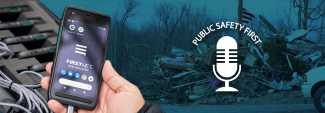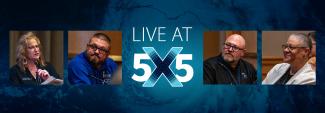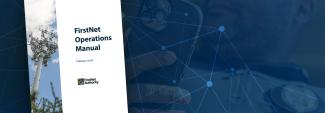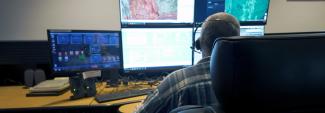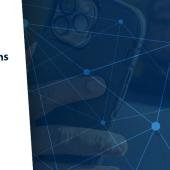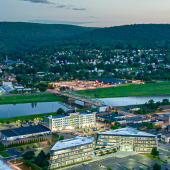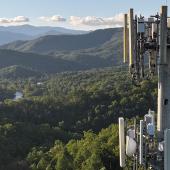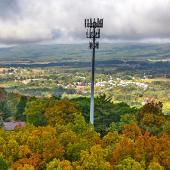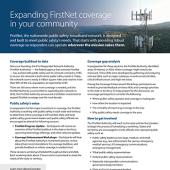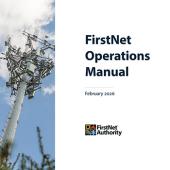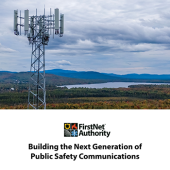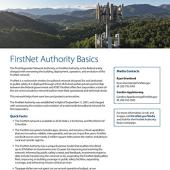Summary
Guest
Gerald Risner, FirstNet Authority Senior Public Safety Advisor
Kevin Mitchell, IT Specialist/Criminal Analyst, Oxford Police Department, Alabama
Transcript
Preview
Episode 66 | Oxford Police leverages compact rapid deployable to boost emergency comms in Alabama
Narrator: You're listening to Public Safety First, a podcast to help you learn about the First Responder Network Authority and how you can be part of the future of public safety technology.
And now, your host.
Episode 66 | Oxford Police leverages compact rapid deployable to boost emergency comms in Alabama
Narrator: You're listening to Public Safety First, a podcast to help you learn about the First Responder Network Authority and how you can be part of the future of public safety technology.
And now, your host.
Gerald Risner: Welcome to the Public Safety First podcast. I'm Gerald Risner, a Senior Public Safety Advisor with the FirstNet Authority. Today, I'm joined by Kevin Mitchell of the Oxford Police Department in Alabama. Kevin serves as an IT specialist and crime analyst for the department. Thanks for joining us today, Kevin. Could you please introduce yourself and tell us a bit more about your role at the police department?
Kevin Mitchell: Alright. My name is Kevin Mitchell. I'm with the Oxford Police Department in Oxford, Alabama. I'm assigned to the East Metro Area Crime Center, which is a real-time crime center, intelligence, and digital forensics program. Our main focus is making sure that we have the most up to date technology and resources for the police department, and specifically my role as a crime analyst and an I.T. specialist, making sure that we have everything at our hands to make sure that we can meet whatever goals and challenges that come throughout our dealing with different criminal activities and city sponsored events where we're supporting the city at large.
Gerald Risner: Thank you for that, Kevin. So, the Oxford Police Department is the first agency in Alabama to purchase a CRD, which is the compact rapid deployable. This device is a customer owned and maintained deployable device that would give you cellular and/or WiFi coverage wherever. Could you tell us a little bit about the city of Oxford and how you use FirstNet and the CRD?
Kevin Mitchell: Alright. So, the City of Oxford itself is a little over 24 square miles. We encompass about three different counties, including Calhoun, Talladega, and Cleburne counties. And so, because of the amount of equipment and resources that we have at our disposal, we get a lot of mutual aid requests. And one of the things that we were finding out is that as we started deploying our SWAT teams and other resources in more rural areas, connectivity was always a pain point. Also, like many other areas in Alabama, we struggle with tornado events. And so, we think we have potentially towers down, radio networks that have been rendered inoperable for any amount of time, we needed a solution that would allow us to have some level of consistent connectivity whenever command and communications wasn't flowing as needed.
And so, in partnering with our local reps, we learned about all the services that FirstNet does offer, and one of those included the SatCOLT trucks. And so, we got in the habit of requesting the SatCOLT for any kind of event where we knew that we would have a tax on the network. And so, we started having these conversations where investing in the CRD would probably be something beneficial for us because that's something that we wouldn't have to rely on scheduling with the FirstNet team at AT&T to get the SatCOLT.
Fortunately, we haven't had to use the unit in deployment. We test it roughly about once a month. But what this capability is giving us, in conjunction with a vehicle that we have purposely built for the CRD unit to deploy it, is the ability to have command and communications deployed at a moment's notice anywhere in the state of Alabama. More specifically in east central Alabama, where we have partnerships with about nine or ten different counties, the ability to go and respond not only from a command and communication standpoint, but also having boots on the ground in a rapid fashion in conjunction with our public safety partners in the city of Oxford, including our EMS and fire department, to be able to send everything and the agency that we're supporting that they need after a traumatic event like a tornado or mass casualty event, and be able to support them with the technology, roll in and basically operate as if nothing has happened from a command and communication standpoint.
Gerald Risner: Excellent. So, are there immediate communications challenges, major events that happened within your area or the region there that you had in mind when purchasing a CRD?
Kevin Mitchell: Yes. So, what started us down this route, in the city of Oxford, we have several key events where we have a minimum of about 10,000 people that will attend these events, including our Christmas parades. We have an Oxford Fest where we have about between 25 to 50,000, depending on the year, of people attending an event in a small area. We have a 4th of July celebration every year called the Freedom Fest. And then we also have a very premier baseball, softball, and soccer complex within the city, which draws a lot of people into the area. And so, what you can imagine is when you have an influx of 50 to 75,000 people that are taxing networks in our local area, from a public safety standpoint, that would always cause us issues with consistent communication, especially with our cellular based assets, whether it be cameras or LPRs [license plate readers] or anything like that.
For the specific events that we had, it was a small area that we needed to have a saturation of consistent cellular coverage. But then also if we ever deployed in the area where we were very rural, cell coverage wasn't very great, we would still have the ability to use the satellite component on a CRD to make sure that when we have these major events or incidents, that we will have the connectivity that is needed to see that incident or critical incident through until it's resolved.
Gerald Risner: So, you mentioned earlier that you haven't had a chance to deploy the device at an event yet. Tell us a little bit about going through training, how that went, and a little bit of what's involved in setting up the CRD.
Kevin Mitchell: The hardest thing unpacking the unit was getting it off the crate. Since then, everything has been very user friendly. Even the chief is very well versed at deploying the unit. The training that was provided by the manufacturer, there are tons of resources on the web. They sent me some good documentation and manuals and essentially, I can hand someone a piece of paper and say, "Here, unload this off the truck." And within about ten or 15 minutes we can have connectivity based on them following that guide. We've deployed it in testing, I would say at least half a dozen times, getting used to the unit, seeing the quirks, having an onboard fuel system which gives us the ability to have extended runtime if we need to use it in a rural area where we don't have ready access to power or the ability to use one of our larger vehicles like our command bus, or we can pull power off of that and use that unit so we can conserve the fuel on the generator and also operate quietly whenever we do have instances where we have a critical incident where we don't necessarily want to be as loud. So, the versatility and the setup, the options for actually powering the unit and sustaining the power on a unit made it a very easy decision for us to choose it.
Gerald Risner: So, I've had the ability to come and view your guys' operation and it's quite impressive there. You have a very expensive mobile command unit or mobile communications bus. Was this device to help augment not only that, but your SWAT teams and on the fly, where and when needed?
Kevin Mitchell: Yes, sir. With our mobile command unit, the one thing that we did not purchase at the time was a satellite backhaul for internet connectivity, just because at the time the prices for that technology was very expensive. I think for what we pay for the CRD, that's what it would have taken to equip that command bus at the time. Now, if we had done that, that would have been something where we wouldn't have the portability, where the command bus may not necessarily meet the needs of a particular incident, but we have the need of a cellular or satellite backhaul in a more rural area that would have basically rendered that useless had that bus not been able to be deployed in that type of area. And so, the concept that we took was creating a support vehicle that has a lot of the functionality as our command bus, but can kind of be a support vehicle to that command bus, so if we do need to use the CRD unit, we have a rapid deployable vehicle that the CRD stays on for us that can either deploy out with the command bus or any one of our assets. And so, now when we're looking at deploying our SWAT team, that is one of the vehicles that is in the stack as far as being sent out for whatever event that we're dealing with. And with that, we have built in WiFi networks that our drones and robots can natively connect to when it's deployed, therefore extending the range that we can operate those devices. And now with the flexibility of how we have it deployed on our communications rapid response truck, we have the ability to send that equipment of the CRD specifically to an event without having to rely on larger vehicles that may or may not be deployed during an event.
Gerald Risner: Very good. So, Kevin, what advice would you give to an agency or a city that's considering purchasing the CRD?
Kevin Mitchell: The biggest thing is having the reassurance that when you potentially have an event where either the network for your cellular provider is going to be taxed, meaning that your first responders won't necessarily have the ability to communicate under normal circumstances, or you're in an area where you support other agencies or as a city or municipality or county agency, having the ability to know that you can be self-sufficient until you can get help. Here in Alabama, you know, we're always under threat of some kind of inclement weather, whether it be tornado season, we have ice storms, severe thunderstorms, things like that. Having the reassurance of knowing that if, at the end of the day, my normal way of communication is put offline for any reason that we have the ability to have a reliable network stood up where our senior leadership from our chief of police, our fire department chief, our mayor, our EMS director, all have the reassurance of knowing that if we lose any kind of cellular connectivity, we have the ability to continue to operate by powering up our CRD unit. Now I know it is an expense, but it also is a peace of mind knowing that if we have a critical incident, that we have the equipment on standby, easily deployable, easily trainable for our staff from whatever situation that is going to be thrown at us, that it will perform the way that we need it to.
We've been a FirstNet customer since 2019, and the majority of our cellular data connectivity has been pushed to FirstNet and then just enhanced our abilities to make sure that when we have a critical need for connectivity and the traditional means are down for whatever amount of time, we have the ability as a city to be self-sufficient and to make sure that all of our equipment has connectivity no matter what.
Gerald Risner: Well, Kevin, again, thank you for that. Is there anything else that you would like to add on the city's behalf?
Kevin Mitchell: As we've gone through this, learning more about FirstNet and the FirstNet Authority, for me, I didn't realize that this was a government-backed program that specifically looks towards making sure that government entities have the ability to have reliable communication on different levels.
I had the privilege of going to the IACP Tech Conference where FirstNet had some large displays and actually had a CRD unit on display, and having conversations with other agencies, it was really surreal seeing how, being an agency that's kind of forward thinking, trying to adopt technology early to make sure that when there is a need for something, we're not scrambling or having to reach out to the authority to send us equipment in a moment's notice. Because we've made this purchase, we're a lot more self-sufficient, which translates to our agency partners in our region being able to deploy this asset when needed.
Case in point, our 9-1-1 center was struck by lightning about two months ago and the center was rendered inoperable for a few days. We were one of the only agencies in our county that was able to operate while they were down and making repairs because we had FirstNet technology and we had the backup systems in place supported by FirstNet, to make sure that we can operate no matter what the circumstances. And that's, for me, a big plus, knowing that we have a partner for one of our critical pieces of infrastructure, which is the ability to communicate, and having that reassurance, which no amount of money can take up the reassurance of knowing that from a public safety standpoint, we will be able to operate, we will be able to answer the calls of our citizens and any other agencies that need help, because we have the technology in place to make sure that we can operate 24/7 with zero downtime.
We're a big believer in FirstNet, especially the more that we've learned about it. Being an early adopter in a lot of the technology that you guys have had, we're getting tons and tons of calls from other agencies and entities that are really trying to figure out how we're leveraging the FirstNet program. So, this is something that we really believe in. And we've been in some situations where the FirstNet network has really come through for us.
Gerald Risner: Kevin, again, thank you for your time today. Thank you for your service. Appreciate you.
Kevin Mitchell: Thank you.
Narrator: Thanks for listening today. We're excited to have you join our podcast community. Make sure to subscribe on iTunes, SoundCloud, and YouTube. You can learn more about the First Responder Network Authority at FirstNet.gov and learn about FirstNet product



